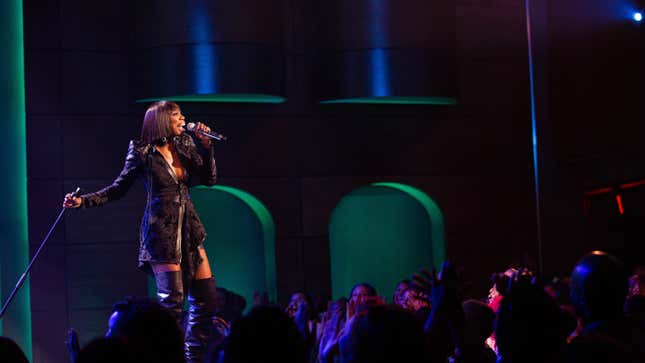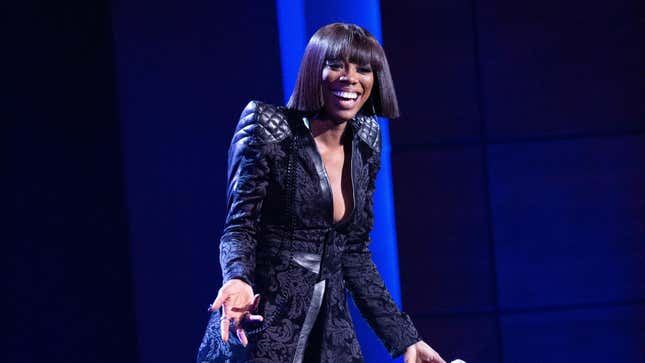
Yvonne Orji is not Molly, y’all. She just plays her on TV (on HBO’s Insecure, in fact). But, there’s a part of her that can relate to Molly and Issa Dee’s devolving friendship.
Writer’s Note: There are spoilers from Insecure Ep. 409 included in this article.
With the super success of Insecure, her podcast (with Luvvie Ajayi) and her upcoming book, Orji is on a roll. Now, after years of working in the comedy scene, the 36-year-old entertainer has landed the coveted sweet spot—a whole comedy special. A “whole” her?! Yes. On the night of June 6, Yvonne Orji: Momma, I Made It! debuted on HBO.
The breakdown of the comedy special, via HBO:
Interspersed with vibrant, personal footage shot in Nigeria, Yvonne’s native home, during a milestone trip in early January, Yvonne Orji: Momma, I Made It! takes an intimate, hilarious look at what being Nigerian-American means to Yvonne—from her international haggling addiction and having her phone tapped by her parents as a kid, to the fine line between cursing people out and putting curses on them. The special was filmed before a live audience at the Howard Theatre in Washington, D.C.
So, I recently hopped on a phone call with Orji to discuss how exactly she got bit by the comedy bug, how she relates to Molly, the difficult process of Africans and black Americans coming together on common ground, and whether or not she’s met DMX.
If you watched the penultimate episode of Insecure’s fourth season, you know that Issa and Molly have realized they may have outgrown each other and accordingly parted ways. While I conducted this interview prior to this episode’s airing (and prior to seeing it myself), Orji’s words ring even truer with hindsight. It may be painful to reconcile with, but we’ve been watching Issa and Molly slowly grow apart throughout several seasons and we’re finally here—realizing that they’re at two totally different points in their lives.
“Once you get to a certain level, yo, one of the hardest [things has been] losing friends,” Orji mused. “Friends who don’t understand the new level you’re at or friends who will put their issues on you and you’re like, how did we get here? Nobody is actually supposed to be here! I think I pulled from that [to portray Molly and her friendship breakup with Issa]. But I also pulled from the strength of Issa and Molly’s friendship, too, because [there’s the] hope that, hopefully, we’ll get it together. The people you love the most, hurt you the most and make you have such a visceral reaction because you love them the most.”
Speaking of getting to a certain level, I’m always fascinated by how comedians know exactly when they have that comedic gift. Comedians are naturally very observant and are able to transform even the most mundane occurrence into something hilarious.
“I didn’t know I had the gift until the first time I did comedy,” Orji confirmed. After a real-life back-and-forth with Jesus, she decided to take the leap of faith onto that terrifying spotlit stage.

“[I sat down and thought about], what’s funny about being Nigerian-American because, at the time, it was a very specific event that I was performing at,” Orji recalled. “But, what’s funny is that is what kind of set off my brand. It’s this dual lens and duality of identity that I have [and I realized] that’s actually what makes me interesting.”
Since her special is very much interspersed with the smell of Jollof and the boastful energy of #NaijaNoDeyCarryLast, I had to ask the tough questions with regard to the ongoing tensions between Nigerians/Nigerian-Americans and black Americans. Whether it’s years-long miscommunication, ignorance, pride, hurt, frustration and more, there are many strong emotions I’d be remiss to ignore. Dubbed the “diaspora war” on social media, I often find myself watching the cyclical, unproductive arguments and the shambles it leaves behind, every time. Will we ever reach a middle ground?
Even speaking from my experience, I grew up feeling a tug of longing for an origin story and a place to ultimately call home. However, even as I gained more knowledge, I still maintained curiosity for where my people originated from, pre-chattel slavery (the cruel irony that we have to pay for those DNA results is another conversation). Nevertheless, I’ve grown to respect and admire the very culture black Americans have established right there. As we’ve seen time and time again, the way we talk, cook, dress, move and more—highly influences other cultures.
“I think it requires both people. [...] There needs to be an understanding on all continents,” Orji noted. “Slavery was horrible. I think we should just put a period there. There’s no confusion. Slavery was a horrible thing that happened to African Americans, period. And like, [for] anybody to argue that, we got beef. The end. Though not in the same way colonialism has ruined Africa in so many ways. You mean to tell me that, in countries of Africa where you find the most oil, the most gold, the most like rubber, everything...we are still considered third world?”
Orji went on to talk about the fact that the same stereotypical images of black America that are fed to us right here in America are also broadcast overseas. As such, it creates an institutionalized disconnect, causing African parents to instill a dissociation in their children once they do immigrate to the U.S.
“Let’s appreciate our differences and make our differences be the things that divide us,” Orji concluded. “I think once you can have that conversation, be real about it, not be selfish and not be so quick-tempered [with each other]. That’s exactly what colonialism and slavery was trying to do.”
We certainly have quite a bit to unpack...and unpack again.
Lastly, as someone who has attended many parties and functions where Orji was a guest, I can attest that she’s arguably the best hype woman in Hollywood right now. One schtick she’s well-known for is impersonating DMX, so I had to ask her whether or not she’d met him.
“I went to a DMX concert in 2014 and he sang ‘Happy Birthday’ to me, since [I was in] the front row,” Orji recalled. “I was like, ‘It’s my birthday!’ and I have a video of him singing ‘Happy Birthday.’ My friends clowned me like, ‘You’re going to a DMX concert in 2014, is it 2008?!’ But, DMX does not know me, he does not know who I am...I don’t even know if he knows I exist. But, mark my words, we are going to put out a gospel compilation album! We’re going to read the New Testament together. There’s going to be some collaboration!”
You can currently stream Yvonne Orji: Momma, I Made It! on HBO Max, HBO Now, HBO Go, HBO On Demand and its partners’ streaming platforms.
This interview has been edited and condensed.



